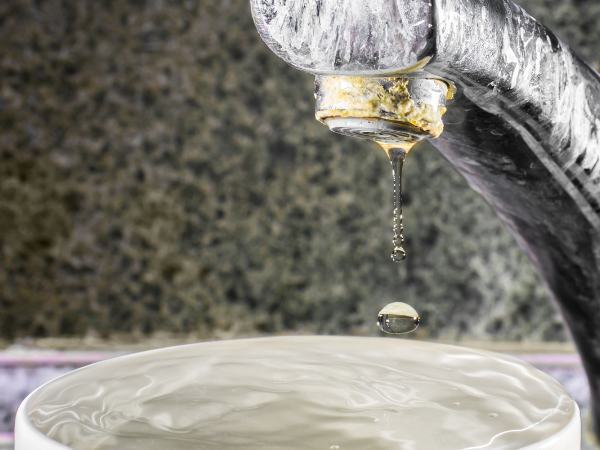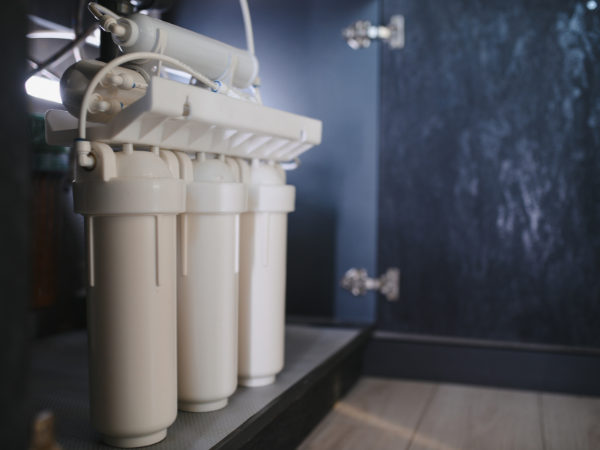Reverse Osmosis Water Filters

The Importance of Reverse Osmosis Water Systems in Home Improvement
More and more homeowners are installing reverse osmosis (RO) water systems as a means of bettering their water supply. These devices filter water over a semi-permeable membrane, eliminating harmful substances and making it suitable for human consumption.
How Does a Reverse Osmosis System Work?
A RO system is comprised of several key components, including a pre-filter, membrane, and post-filter. The pre-filter removes larger particles such as sediment and chlorine, while the membrane is responsible for removing smaller particles such as bacteria and dissolved solids. The post-filter acts as a final polisher, removing any remaining impurities.
The Benefits of Reverse Osmosis Water Systems
The ability of RO systems to purify water by filtering out various contaminants is a major advantage. Lead, arsenic, fluoride, and chlorine are just some of the water contaminants that have been linked to health problems and unpleasant aftertastes.
RO systems also have the added bonus of making our water smell and taste better. In comparison to plain tap water, many people prefer the cleaner, crisper flavor of water that has been treated with a RO system.
RO systems also have the added bonus of making our water smell and taste better. In comparison to plain tap water, many people prefer the cleaner, crisper flavor of water that has been treated with a RO system.
Drawbacks of Reverse Osmosis Systems
While reverse osmosis systems offer many benefits, there are also some drawbacks to consider. One of the main drawbacks is that RO systems can be expensive to purchase and maintain. Additionally, these systems can waste a significant amount of water during the filtration process.
Additionally, RO systems can remove beneficial minerals from the water. This is why some manufacturers include a remineralization stage in their systems to add back certain minerals that are beneficial to our health.
The Advantages of Installing a Reverse Osmosis System in Your Home
Having a reverse osmosis (RO) system installed in your home can boost the quality of your water, making it safer to drink and more pleasant to the senses. These units are made to purify water and make it safer for human consumption by getting rid of harmful substances.
Removing Impurities and Contaminants
Toxins and chemicals including lead, arsenic, fluoride, and chlorine can be effectively removed from water by using a RO system. By filtering out impurities like these, RO systems boost water quality and mitigate potential health and flavor issues.
Improving the Taste and Smell of Water
A lot of individuals prefer the cleaner, crisper flavor of RO-treated water to what they get from the tap. Because RO systems get rid of pollutants and other nasties that could otherwise alter the water's flavor or aroma, the resulting supply is far more desirable. Furthermore, RO systems with a post-filter can further enhance water quality by eliminating odor and flavor-causing contaminants.
Enhancing Health Benefits
RO systems can also enhance the health benefits of drinking water. By removing impurities and contaminants, RO systems can help to protect against a wide range of health issues, including things like cancer, heart disease, and neurological disorders. Additionally, by removing impurities that can affect the taste and smell of water, RO systems can encourage people to drink more water, which can have numerous health benefits.
Cost and Maintenance
While RO systems can be expensive to purchase and install, they are relatively low maintenance and can last for many years with proper care. Additionally, many RO systems are designed to be energy efficient, which can help to reduce operating costs over time.
In conclusion, reverse osmosis systems offer a number of advantages for homeowners looking to improve the quality of their water. From removing impurities and contaminants to enhancing the taste and smell of water, to improving overall health, an RO system can provide a wide range of benefits that make it a worthwhile investment.
The Importance of Regular Maintenance for Reverse Osmosis Systems
An RO system is a great approach to upgrade your home's water quality by filtering out impurities. Of course, they still need to be serviced on a regular basis just like the rest of your home's appliances. Water quality issues, higher running expenses, and even system failure might result from skipping routine maintenance on your RO system.
Changing the Pre-filter
Before the water reaches the membrane, it goes through a pre-filter, which gets rid of silt and chlorine and other bigger particles. The pre-ability filter's to purify the water relies on how often it is replaced. The pre-filter should be replaced every six months to a year, depending on the system, at the absolute least.
Cleaning the Membrane
When water passes over a membrane, larger particles like germs and dissolved solids are filtered out. The membrane's efficiency declines as it collects contaminants over time. The membrane's ability to filter out contaminants from water relies on how often it is cleaned. Maintenance intervals for membranes range from once every year to two years, with the former being the more universally suggested choice.
Replacing the Post-filter
The post-filter cleans the water one last time to make sure it's completely pure. To keep the post-filter functioning properly and removing contaminants from the water, it should be replaced on a regular basis. Although it is system-specific, post-filters should be changed at least once every six to twelve months.
Final Thoughts On RO Water Filters
For better quality water at home, reverse osmosis systems are highly recommended. They can enhance our water's flavor and aroma while also eliminating harmful contaminants. Having access to clean, safe water in our homes is well worth the initial expenditure, despite a few negatives to think about, such as the price and water waste. In order to keep your RO system in good working order and providing your household with clean, safe water, routine maintenance is required. If you maintain your system by regularly replacing the pre-filter, cleaning the membrane, and installing a new post-filter, you can keep your water purification system running smoothly and efficiently for years to come.




